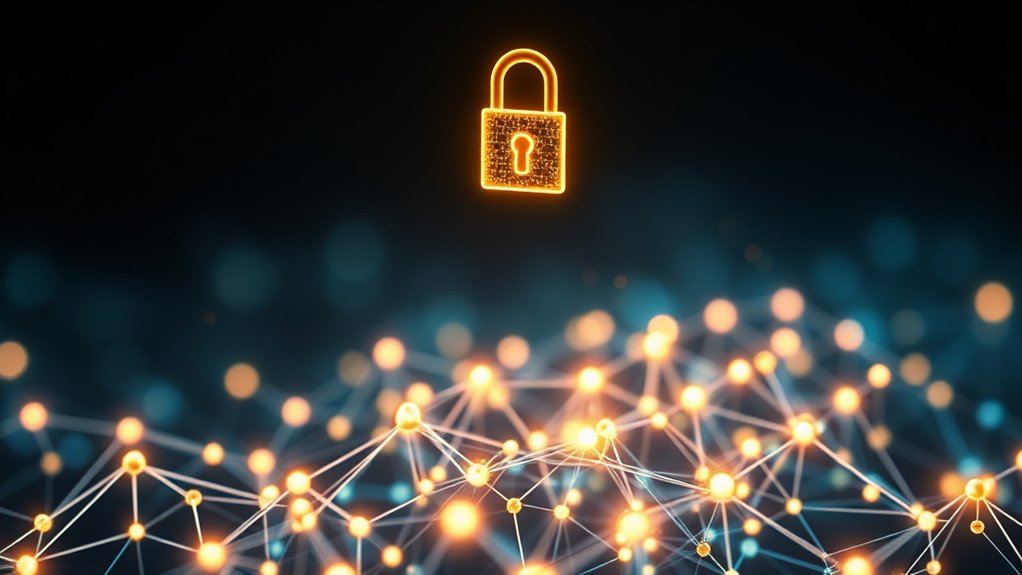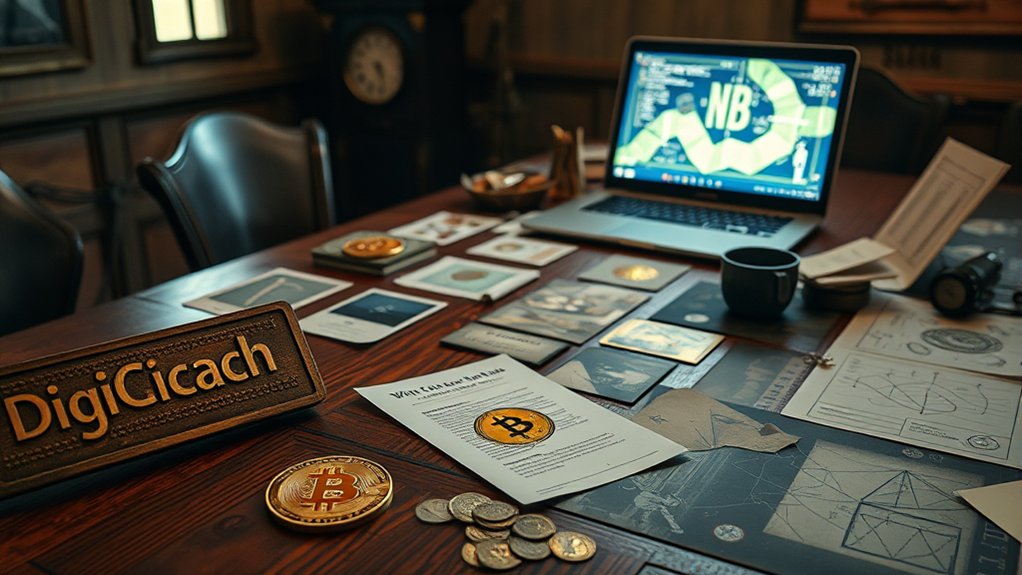Blockchain isn’t just a buzzword; it’s flipping the script on trust. This tech creates a decentralized, tamper-proof ledger for transactions. No central authority, no shady business—just transparency. It improves finance, healthcare, and supply chains, making everyone accountable. Imagine a world where records can’t be messed with! So, if you think trust in digital transactions is dead, think again. And there’s a whole lot more to this story that’s worth exploring.

Blockchain: Revolutionizing Trust
In a world where trust is often as scarce as a unicorn in a desert, blockchain technology swoops in like a superhero. Seriously, it’s like the caped crusader of the digital age. With its decentralized, distributed ledger, blockchain records transactions across multiple computers. No more shady dealings behind closed doors. Transparency? Check. Security? Double check. It tosses out the need for a central authority, slashing the risk of manipulation and fraud like a samurai with a sword.
Those advanced cryptographic algorithms? They’re the bodyguards of your data, ensuring no one can mess with it. It’s like having a vault that not only locks your valuables but also has a guard dog that bites anyone attempting to tamper with it. And guess what? The global blockchain market is projected to hit $39.7 billion by 2025. That’s a lot of cash flowing into this tech wonderland. The technology is also being adopted for various applications beyond cryptocurrency, showcasing its versatility.
Blockchain’s transparency doesn’t just make it a tech geek’s dream; it’s a game-changer for various industries. In finance, it streamlines cross-border payments, making fraud as rare as a unicorn sighting. In healthcare, it secures medical records like a fortress, ensuring only authorized eyes can peek. Supply chains? They’re now as clear as glass, tracking goods like a hawk. Blockchain’s decentralized architecture leads to cost savings and operational efficiencies that further enhance its value. Furthermore, its decentralized and distributed ledger system improves accountability by ensuring all transactions are visible and verifiable by all parties involved.
Let’s not forget governance, risk, and compliance. Blockchain enhances these areas by providing a transparent system for data integrity. It’s like having a clear window into the mundane world of compliance processes, making it easier and less painful. Those immutable records? They hold everyone accountable.
In short, blockchain is not just about tech; it’s about trust. It fosters credibility, removes pesky intermediaries, and builds a digital economy that’s open to all. With its potential to revolutionize how we perceive trust, it’s high time we embraced this tech superhero. Who needs unicorns when you have blockchain?
Frequently Asked Questions
How Does Blockchain Technology Enhance Data Security and Privacy?
Blockchain technology supercharges data security and privacy like nothing else. It spreads data across a network, so hackers can’t just waltz in and steal everything.
Records are immutable. Once it’s in, it’s in—no take-backs. Plus, cryptographic methods keep identities hidden. Think zero-knowledge proofs and ring signatures.
Sure, it’s all transparent, but that’s kind of the point. It’s a double-edged sword—secure yet traceable. Talk about a wild ride in data protection!
Can Blockchain Be Used for Voting Systems?
Can blockchain be used for voting systems? Absolutely, if you can get past the skepticism.
It offers a decentralized way to vote, making it hard to mess with those precious ballots. Immutable records? Check. Anonymity? Double-check. Voters can verify their choices, which is a nice touch.
Sure, there are scalability and accessibility issues, but hey, the potential is huge. If only everyone could just get on board with it.
What Industries Can Benefit the Most From Blockchain?
Blockchain is shaking things up in several industries.
Healthcare? Better data security.
Finance? Faster transactions and lower fees.
Supply chain? Traceability galore!
Energy? Peer-to-peer trading is a game-changer.
Government? Secure voting systems—imagine that!
And don’t forget about digital advertising and the cannabis industry.
Traceability is key.
Food safety? Check.
Gaming? Transfer digital assets like a boss.
How Does Blockchain Impact Transaction Speed and Costs?
Blockchain impacts transaction speed and costs in a big way. High network congestion? Slow transactions. It’s like rush hour for data.
Different consensus mechanisms, like PoW and PoS, also play a role—PoS is faster, duh. Fees can skyrocket when networks are busy.
And while some blockchains are cheap, others feel like a wallet vacuum. With innovations like Layer-2 solutions, things might get better, but for now, it’s a mixed bag of speed and cost.
Is Blockchain Energy-Efficient Compared to Traditional Systems?
Blockchain can be a refreshing change for energy efficiency, especially when compared to traditional systems.
Proof of Stake (PoS) is a game-changer, slashing energy use dramatically. Meanwhile, a single Bitcoin transaction? It guzzles energy like it’s in a contest. Yikes!
But hey, blockchain offers greener paths—think renewable energy trading and carbon credit tracking. It’s not perfect, but it’s a step toward cutting down that hefty carbon footprint.





